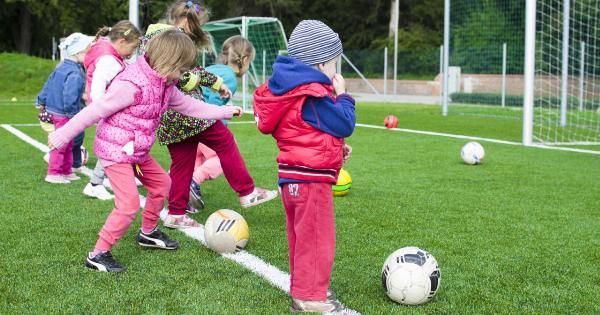Participating in sports can have a positive impact on your child’s physical and mental health. Physical activity is essential for the development of strong muscles and bones, while also reducing the risk of chronic diseases later in life.
Additionally, sports can contribute to the improvement of mental well-being by reducing stress and boosting self-esteem. In this article, we will explore the many ways in which sports can benefit your child’s overall health.
1. Physical Fitness
Sports require physical exertion, which helps in developing strong muscles and bones. Regular physical activity through sports can improve cardiovascular health, increase stamina, and enhance coordination and flexibility.
Engaging in sports from a young age can help your child build a strong foundation of physical fitness, making it more likely for them to maintain an active lifestyle as they grow older.
2. Obesity Prevention
In recent years, childhood obesity has become a growing concern. Sports and other physical activities play a crucial role in preventing and reducing obesity among children.
Regular participation in sports helps burn calories, maintain a healthy weight, and develop good habits early on. It also teaches children about the importance of nutritious diets and the harmful effects of a sedentary lifestyle.
3. Social Interaction and Teamwork
Sports provide an excellent opportunity for children to interact with their peers and develop social skills. Joining a sports team allows children to form new friendships, learn teamwork, communicate effectively, and develop leadership qualities.
These social interactions boost their confidence, self-esteem, and overall emotional well-being.
4. Discipline and Time Management
Participating in sports requires discipline and time management. Regular training sessions and competitions teach children the importance of discipline, punctuality, and managing their time effectively.
These skills extend beyond the field and become valuable assets for their academic and personal lives. Sports can help children become more organized, responsible, and balanced individuals.
5. Stress Relief and Mental Well-being
Physical activity, such as sports, releases endorphins—natural feel-good hormones—in the brain. These hormones act as natural stress relievers, reducing anxiety and promoting a positive mental state.
Engaging in sports helps children manage stress, cope with challenges, and develop resilience. It can also contribute to better sleep patterns, which are essential for mental health.
6. Self-Confidence and Self-Esteem
When children participate in sports, they can experience a sense of accomplishment and develop self-confidence. Learning new skills, improving performance, and receiving acknowledgment from coaches and teammates enhance their self-esteem.
Sports also teach children how to handle both success and failure, fostering resilience and a positive self-image.
7. Brain Development
Sports can have a positive impact on brain development. Physical activity increases blood flow to the brain, delivering oxygen and essential nutrients needed for optimal cognitive function.
Research shows that regular exercise can enhance memory, attention span, and overall brain performance. Playing sports also improves problem-solving skills, strategic thinking, and the ability to make quick decisions.
8. Healthy Competition
Participating in sports introduces children to healthy competition. They learn about fairness, sportsmanship, and how to handle winning or losing graciously. Healthy competition fosters motivation and the drive to improve.
It also helps children develop resilience, perseverance, and the ability to overcome obstacles—valuable traits that can be applied to various aspects of life.
9. Improved Academic Performance
Sports and academic performance are closely linked. Engaging in regular physical activity through sports can enhance cognitive abilities, attention span, and concentration.
Research suggests that children who participate in sports have improved academic performance, higher test scores, and better overall educational outcomes. Sports teach children valuable skills such as goal setting, time management, and discipline, which translate into improved academic success.
10. Lifelong Healthy Habits
By engaging in sports during childhood, children are more likely to develop and maintain healthy habits throughout their lives.
Regular physical activity becomes an ingrained part of their routine, reducing the risk of sedentary behavior and associated health problems in adulthood. The lessons learned from participation in sports pave the way for a healthier future.
Conclusion
Participating in sports provides numerous physical and mental health benefits for children. Regular physical activity helps in the development of strong muscles and bones, preventing obesity and chronic diseases later in life.
Sports also contribute to the improvement of mental well-being by reducing stress, boosting self-esteem, and developing valuable skills such as discipline, teamwork, and time management. Furthermore, sports provide an avenue for social interaction, healthy competition, and improved academic performance. Encouraging your child to engage in sports can set them on a path towards a healthier, happier, and more successful future.































